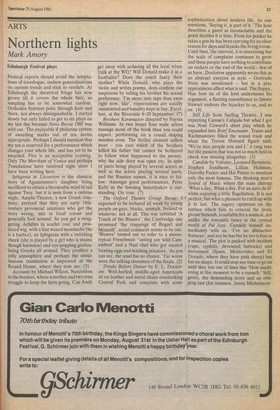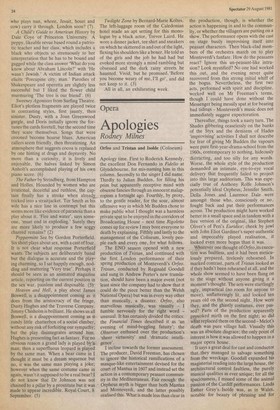ARTS
Northern lights
Mark Amory
Edinburgh Festival plays Festival reports should avoid the temptations of travelogue, eschew generalisations on current trends and stick to verdicts. At Edinburgh the theatrical fringe has now grown till it covers the whole face, so sampling has to be somewhat random. Orthodox features poke through here and there, not always distinguishable. I started slowly but only failed to get to six plays on my last day because News Revue 1981 was sold out. The enjoyable if philistine system of awarding marks out of ten seems appropriate. Perhaps I should mention that my ten is reserved for a performance which changes your whole life, and has yet to be awarded. Five is an acceptable evening. Only The Merchant of Venice and perhaps Translations have received eight since I have been writing here.
lphigenia in Lixourion is the classical story of Agamemnon's daughter being sacrificed to obtain a favourable wind to sail against Troy, but it is seen from a curious angle. Amphi-Theatre, a new Greek company, pretend that they are early 18thcentury provincial amateurs who get the story wrong, mix in local colour and generally fool around. So you get a swaggering Achilles in scarlet coat and powdered wig, with a fine waxed moustache (he is a barber), an Iphigenia with a twitching cheek (she is played by a girl who is insane though harmless) and eye-popping gesticulating Greeks all around. They produce a jolly atmosphere and perhaps the simultaneous translation is improved at the Round House, where they now are. (5) Accounts by Michael Wilcox. Naturalism in the borders, where a mother and two sons struggle to keep the farm going. Can Andy get away with seducing all the local wives (talk at the WI)? Will Donald make it as a footballer? Does the coach fancy their mother? While Donald, who plays the violin and writes poems, does confirm our suspicions by telling his brother his sexual preference: 'I'm more into tups than ewes right now, like', expectations are usually outsmarted and banality kept at bay. Excellent, at the Riverside 8-20 September. (7) Brothers Karamazov directed by Faynia Williams. In two hours four male actors manage more of the book than you could expect, performing on a round sloping wooden cross. The thriller element suffers most — you care which of the brothers killed his father but cannot be bothered to follow what happened to the money, why the side door was open etc. In spite of parts being played by several actors as well as the actors playing several parts, and the Russian names, it is easy to follow. Amongst good performances, Peter Kelly as the fawning Smerdyakov is outstanding. On tour. (7) The Oxford Theatre Group Revue. 1 expected to be lectured all week by young people on gays, blacks, animals, Ireland or whatever; not at all. This was subtitled 'A Touch of the Bizarre', the Cambridge one promised 'the trappings of Bogart and Minnelli', social comment seems to be out. 'Bizarre' turned out to refer to a stereotypical Frenchman "unting zee wild Camembert' and a Nazi chef who got excited beating eggs and mashing potatoes, 'As you can see, the spud has no chance.' Far worse were the talking chessmen of the finale. (2) Drinks Before Dinner by E. L. Doctorow. Well-heeled, middle-aged Americans sit on leather and metal chairs overlooking Central Park and complain with some sophistication about modern life. As one mentions, 'Saying it, is part of it.' The host describes a guest as inconsolable and the guest decides it is true. From his pocket he takes a gun he has been carrying for no clear reason for days and hijacks the living-room. Until then ;the interval, it is interesting but the scale of complaint continues to grow and these people have nothing to contribute on rockets or the end of the world — few of us have. DoctOrow apparently wrote this as an abstract exercise in style — Gertrude Stein was mentioned — but in a play appearances affect what is said. The floppy, blue bow tie of the host undermines his argument, a fleeting resemblance to Jimmy Stewart endears the hijacker to us, and so on. (4) Still Life from Surfing Theatre. I was expecting Camus's Caligula but what I got was Noel Coward's short play which he expanded into Brief Encounter. Trains and Rachmaninov filled the sound track and when the Trevor Howard figure said, 'We're nice people you and I,' it rang true but the passion that was not so much held in check was missing altogether. (3) Candide by Voltaire, Leonard Bernstein, Stephen Sondheim, Lillian Hellman, Dorothy Parker and Hal Prince to mention only the most famous. The thinking man's Sound of Music where the nuns chirrup 'What a day, What a day, For an auto da fe' while enjoying a little flagellation. It is not perfect, but what a pleasure to catch up with it at last. The sugary optimism on the surface which fails to conceal the lively gloom beneath, is suitable for a musical, not unlike the romantic tunes in the cynical world of Pal Joey. Candide himself immediately tells us, I've no distinctive features', and nor he has but he too is fine in a musical. The plot is packed with incident (rape, syphilis, devoured buttocks) and movement (Spain, Montevideo and El Dorado, where they have pink sheep) but has no shape. It could stop any time or go on until they run out of lines like 'How maddening at this moment to be a eunuch.' Still, gusto, the demanding score and an obliging cast (for instance, Jenny Michelmore who plays nun, whore, Jesuit, houri and cow) carry it through. London soon? (7) A Child's Guide to American History by Dale Coye of Princeton University. A peppy, likeable revue based round a patriotic teacher and her class, which includes a black who objects so strenuously to her interpretation that he has to be bound and gagged while the class answer 'What do you know about Abraham Lincoln?' with 'He wasn't Jewish.' A victim of Indian attack elicits 'Porcupine city, man.' Parodies of Shakespeare and operetta are slightly less successful but I liked the flower child murmuring 'The tree is our friend'. (6) Sweeney Agonistes from Surfing Theatre. Eliot's plotless fragments are played twice in contrasting styles, first jaunty, then sinister. Dusty, with a Joan Greenwood gurgle, and Doris initially ignore the fortunes the cards foretell, but the second time they scare themselves. Songs that were crooned become hoarse blues. American callers seem friendly, then threatening. An atmosphere that suggests cocoa is replaced by one hinting at drugs and depravity. No more than a curiosity, it is lively and enjoyable, the halves linked by Simon Anholt's accomplished playing of his own piano score. (6) The Father by Strindberg, from Hampton and Holles. Hounded by women who are irrational, deceitful and ruthless, the captain finally has a stroke when already tricked into a straitjacket. Tor Smith as his wife has a nice line in contempt but this seems more like evidence of paranoia than a play about it. 'Fire and water', says someone, 'must end in exploding.' Surely they are more likely to produce a few soggy charred remains? (2) Peppermint Sea by Gordon Porterfield. Six short plays about sex, with a cast of four. It is not clear what response Porterfield wants. The subjects are deliberately banal but the dialogue is accurate and the playing charming, so I sat happily enough, nodding and muttering 'Very true'. Perhaps it should be seen as an animated magazine article, reporting on the current position in the sex war, painless and disposable. (5) Heaven and Hell, a play about James Boswell, is a disappointment coming as it does from the aristocracy of the fringe, Dusty Hughes and the Traverse Company. Jimmy Chisholm is brilliant. He shows us all Boswell, is a disappointment coming as it randy little chatterbox of a social climber, without any risk of forfeiting our sympathy; but the play disintegrates around him. Hughes is presenting fact as fantasy. For no obvious reason a grand lady is played by a man; then a superfluous leopard is played by the same man. When a bear came in I thought it must be a dream sequence but no, it was the same man playing a joke; however when the same costume came in again, wasn't it supposed to be a real bear? I do not know that Dr Johnson was not chained to a pillar by a prostitute but it was made to appear incredible. Royal Court, 8 September. (5) Twilight Zone by Bernard-Marie Koltes. The left-luggage room of the Caledonian hotel made an apt setting for this monologue by a black actor, Trevor Laird. He wore a dinner jacket, tee shirt and sneakers on which he skittered in and out of the light, flexing his shoulders like a boxer. He told us of the girls and the job he had had but evoked more strongly a mind rambling but obsessed and the dark rainy streets he haunted. Vivid, but he promised, 'Before you become weary of me, I'll go', and did not keep to it. (3) All in all, an exhilarating week.



































 Previous page
Previous page